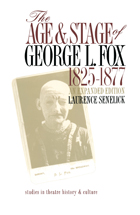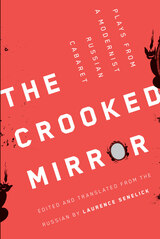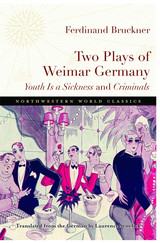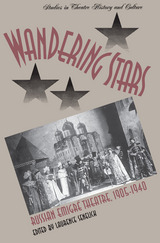4 books about Senelick, Laurence

The Age and Stage of George L. Fox, 1825-1877
1825-1877
Laurence Senelick
University of Iowa Press, 1999
Senelick's biography of the panto clown Laff Fox, renowned in his time as America's funniest performer, brings this most popular and most tragic legend to life. In his new essay to this expanded edition, Senelick draws upon recent discoveries and insights to further animate Fox's remarkable career.
[more]

The Crooked Mirror
Plays from a Modernist Russian Cabaret
Edited and translated from the Russian by Laurence Senelick
Northwestern University Press, 2023
An anthology of plays from the Crooked Mirror, the leading Russian cabaret of the Silver Age
“Don’t blame the mirror if your mug is crooked!”
Parody dominated early twentieth-century Russian cabaret, but the Crooked Mirror extended its lampooning to theatrical practice itself. Eclectic in its targets, the Saint Petersburg theater mocked not only naturalism but also symbolism, futurism, and “Meyerholditis.” Its shows parodied both the stale conventions of melodrama and opera and the stylized trends in staging, wielding satire to provoke artistic and social reform. Though the theater was liquidated in 1931, many of its innovations would become standard techniques in cabaret repertoires and improv revues.
As a cultural phenomenon of the Silver Age, the Crooked Mirror deserves critical attention, yet it has received only fleeting mention in histories of Russian theater and biographies of its major figures. This anthology fills a critical gap in our understanding of that heady era by bringing together key plays—most appearing in English here for the first time—together with short biographies of their authors and robust commentary and annotations. Laurence Senelick guides readers through the artistic and ideological evolution of the Crooked Mirror and provides performers with the material to bring its innovations back to the stage.
“Don’t blame the mirror if your mug is crooked!”
Parody dominated early twentieth-century Russian cabaret, but the Crooked Mirror extended its lampooning to theatrical practice itself. Eclectic in its targets, the Saint Petersburg theater mocked not only naturalism but also symbolism, futurism, and “Meyerholditis.” Its shows parodied both the stale conventions of melodrama and opera and the stylized trends in staging, wielding satire to provoke artistic and social reform. Though the theater was liquidated in 1931, many of its innovations would become standard techniques in cabaret repertoires and improv revues.
As a cultural phenomenon of the Silver Age, the Crooked Mirror deserves critical attention, yet it has received only fleeting mention in histories of Russian theater and biographies of its major figures. This anthology fills a critical gap in our understanding of that heady era by bringing together key plays—most appearing in English here for the first time—together with short biographies of their authors and robust commentary and annotations. Laurence Senelick guides readers through the artistic and ideological evolution of the Crooked Mirror and provides performers with the material to bring its innovations back to the stage.
[more]

Two Plays of Weimar Germany
Youth Is a Sickness and Criminals
Ferdinand Bruckner, Translated from the German by Laurence Senelick
Northwestern University Press, 2018
Two Plays of Weimar Germany offers new translations, by the renowned theater scholar and translator Laurence Senelick, of popular works by the playwright Ferdinand Bruckner: Youth Is a Sickness (Krankheit der Jugend) and Criminals (Die Verbrecher).
Though his fame was later eclipsed by peers such as Bertolt Brecht, Bruckner was the celebrity dramatist of his time, and a new generation of readers is discovering his groundbreaking plays known for their strong cultural critique and unflinching portrayals of social ills, outcasts, and misfits. Youth Is a Sickness (1924) explores the lives of Germany's "lost generation," those who grew up during and after the cataclysm of the First World War, devoid of hope and ideals, lost in a haze of sex and drugs. Criminals (1926) traces several court cases about a failed double suicide, theft, abortion, and homosexual blackmail, controversial topics for the audience of its time and even today. Its innovative staging and interwoven storylines illuminate the imposed social tensions and legal injustice faced by the characters.
In this expert translation, readers can see Bruckner as a public intellectual, a man committed to commenting on the fate of Germany; humane values; and the past, present, and future in his work. With an introduction by the translator, this volume will be the definitive version for readers, actors, playwrights, and scholars.
Though his fame was later eclipsed by peers such as Bertolt Brecht, Bruckner was the celebrity dramatist of his time, and a new generation of readers is discovering his groundbreaking plays known for their strong cultural critique and unflinching portrayals of social ills, outcasts, and misfits. Youth Is a Sickness (1924) explores the lives of Germany's "lost generation," those who grew up during and after the cataclysm of the First World War, devoid of hope and ideals, lost in a haze of sex and drugs. Criminals (1926) traces several court cases about a failed double suicide, theft, abortion, and homosexual blackmail, controversial topics for the audience of its time and even today. Its innovative staging and interwoven storylines illuminate the imposed social tensions and legal injustice faced by the characters.
In this expert translation, readers can see Bruckner as a public intellectual, a man committed to commenting on the fate of Germany; humane values; and the past, present, and future in his work. With an introduction by the translator, this volume will be the definitive version for readers, actors, playwrights, and scholars.
[more]

Wandering Stars
Russian Emigré Theatre, 1905-1940
Laurence Senelick
University of Iowa Press, 1992
From the beginning of this century, wars, pogroms, revolution, and economic hardship have impelled Russian cultural figures to seek their fortunes abroad—and theatre people have been no exception. This movement was a windfall for Western Europe and North America, for often the most talented and exciting actors and directors put down roots in foreign lands. Their styles and messages were transmuted in the process, but the inspiration they provided was tremendous.
Now, Wandering Stars is the first book in any language to look closely at this theatrical emigration. Essays by Russian and American scholars and practitioners examine the ways in which the process of transplanting art distorted, magnified, or otherwise altered originals and how expectations on both sides led to disappointments and achievements. A particular strength of this collection is its attention to the question of the transmission of one culture to another.
The thirteen essays in Wandering Stars, originally presented at a landmark 1991 conference at Harvard University, approach a host of historical, cultural, and theatrical issues. The effects of the pioneer touring companies of Pavel Orlenev, Alla Nazimova, and, most significantly, the Moscow Art Theatre are traced. The fates of actors like Maria Germanova and directors like Theodore Komisarjevsky who settled in the West receive careful inquiry. The techniques and influences of charismatic teachers such as Michael Chekhov and Andrius Jilinsky are examined, and the fortunes of cabarets like the Chauve-Souris and experimental playwrights like Nikolay Evreinov are given careful study. In addition, essays analyze the fascination America has held for Russian artists throughout history and the problems which face any emigrant who tries to preserve the best of his or her culture in an alien environment.
With the continuing interest in interculturalism evinced in the academy, popular literature, and the media, Wandering Stars makes a vital and timely contribution to the ongoing inquiry and debate. This book should be of interest to all students of theatre and Russian life and all those with an abiding interest in the realities of a global society. [more]
READERS
Browse our collection.
PUBLISHERS
See BiblioVault's publisher services.
STUDENT SERVICES
Files for college accessibility offices.
UChicago Accessibility Resources
home | accessibility | search | about | contact us
BiblioVault ® 2001 - 2024
The University of Chicago Press









